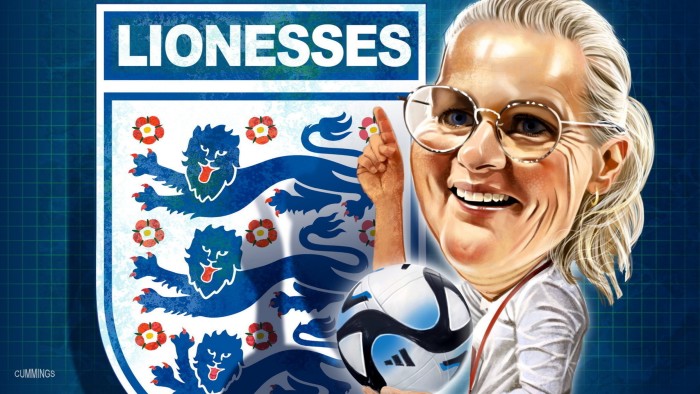Sarina Wiegman: a cool-headed coach with World Cup glory in her sights

Roula Khalaf, Editor of the FT, selects her favourite stories in this weekly newsletter.
Sarina Wiegman told her England team they’d been picked for Euro 2022 by handing them each a golden ticket with the words: “Congratulations! You’re going to the Euros!”
The Dutch coach has a way of mixing playfulness with a relentless focus, which has made her one of the most successful managers in women’s football history. The message also proved prescient. Those golden ticket-holders would go on to win the tournament in front of a packed Wembley Stadium, catapulting women’s football into the mainstream and turning previously unknown players into household names overnight.
A year on, Wiegman finds herself facing her greatest challenge yet: guiding an England team ravaged by injury to potential World Cup glory. The Lionesses face hosts Australia in the semi-finals on Wednesday after beating Colombia 2-1 on Saturday, and expectations are rising as rivals fall away. Bookmakers rate England as favourites to lift the trophy in Sydney on August 20.
Wiegman, 53, is already a national hero in two countries, having delivered European championships for England and her native Netherlands five years earlier. She first began playing football as a child on the streets of The Hague with her twin brother and the other local kids, cutting her hair short to fit in with the boys. At 16 she was called up to play for Holland, eventually earning 104 caps for her country. Three years later, she was scouted by the head coach of the US women’s national team, Anson Dorrance, who convinced her to spend a year playing at the University of North Carolina.
Wiegman’s brief stint in the US — where women’s football was far more advanced than in Europe — proved instructive. She returned home with new ideas on everything from tactics to sports science. The game in Europe had yet to turn professional so she worked as a teacher while continuing to play football part-time.
A midfielder for much of her career, she developed a reputation as an on-field leader. Her team won the Dutch league twice before Wiegman retired in 2003 while pregnant with her second child. She returned to football as a coach soon after at her old club Ter Leede, then at ADO Den Haag when the women’s league turned professional in 2007, before becoming assistant Dutch national coach in 2014.
The breakthrough came in 2017, six months before the Netherlands was due to host the women’s Euros. The national side had been on a losing streak heading into the tournament and the Dutch football authorities, seeking a turnaround, put Wiegman in charge. She immediately rallied the team, leading them to victory. Two years later she took the same team to the World Cup final, where they lost to the US.
Her success turned heads in England, where the Football Association was looking for a new head coach for its women’s team. She started the job in late 2021; her first game in charge was an 8-0 drubbing of North Macedonia, kicking off an unbeaten run that lasted for 30 matches. Under Wiegman, England have lost just once in 36 games, scoring 148 goals and conceding 14.
Known for her mix of coolheadedness, competitive drive and tactical savvy, Wiegman deploys quirky management techniques that leap straight out of business school textbooks. Soon after taking charge of the Netherlands, she gave players a copy of an article entitled: “Thirteen things you should give up if you want to be successful”. Give up your excuses. Give up your perfectionism. Give up your need to be liked.
During early training sessions she would arrange mini-competitions among the squad, with prizes including an empty picture frame in which players could visualise a photo of themselves holding a trophy aloft. “Football brings us together,” Wiegman recently told a BBC podcast hosted by Jill Scott, part of last year’s winning Lionesses team. “But when you enjoy yourself that helps — so we’re trying to bring some joy.”
In her early days as England coach, she repeated the techniques that had galvanised her Dutch team years earlier, encouraging the players to manifest success through drawing and poetry. “She came in and instantly we felt her aura. She was a leader for the whole staff and all the players”, said Ellen White, England’s record goalscorer and part of the winning team from Euro 2022. “Being a female team we like to communicate, we like someone to talk to us, we like someone to be honest with us, and we’d never had that before. Every single player knew their role and their responsibility. That was the missing ingredient that elevated us to win.”
Wiegman’s approach has fostered an unbreakable team spirit — an attribute that shone through during England’s fortuitous victory on penalties earlier this week against Nigeria. “Sarina is a brilliant coach, tactician and leader, as well as being a fantastic person to work with”, said Mark Bullingham, chief executive of the FA. “English football is lucky to have her as she adds value to everything we do on and off the pitch.”
After winning Euro 2022, Wiegman was interrupted two minutes into her post-match press conference by a conga-line of jubilant players singing English football’s adopted anthem “It’s Coming Home”. The phrase had been banned in the England camp, but the victorious team saw an opening to break the rules.
As the players left the room, a hoarse-sounding Wiegman immediately snapped back into her role as England’s sober head coach, but conceded: “We won the cup . . . and we’re really happy.” Now the goal is to go one better and secure a global victory.
Comments